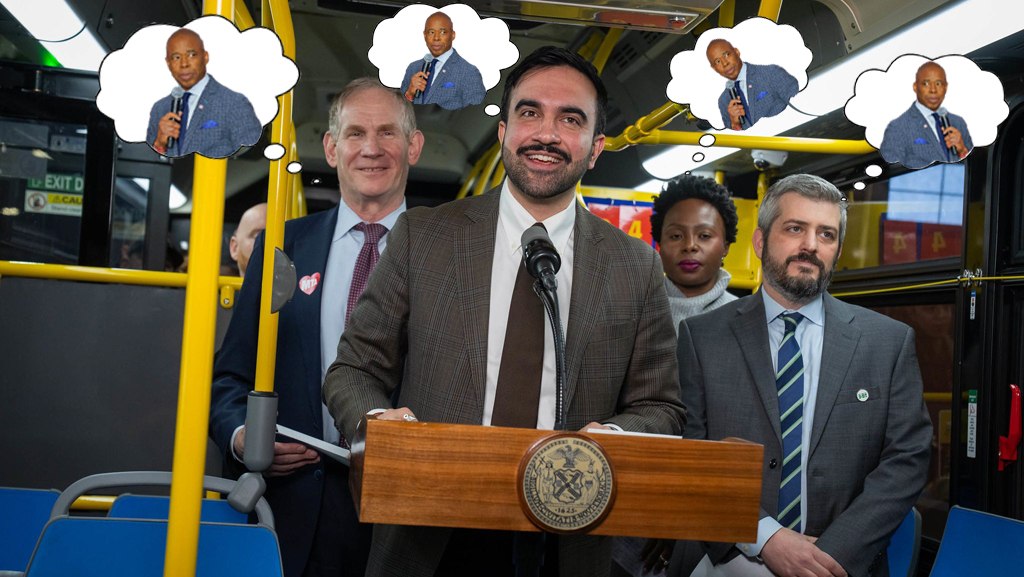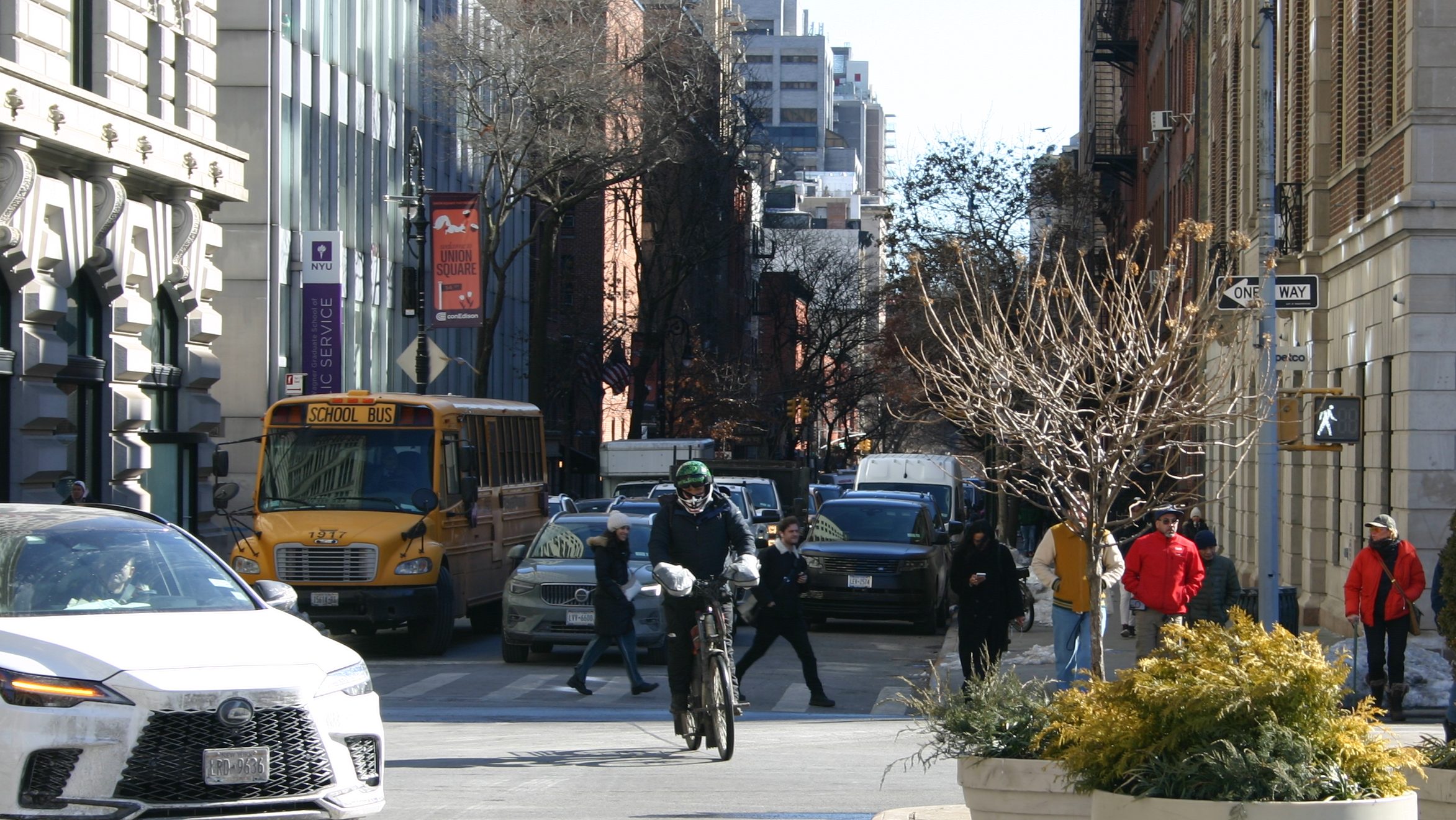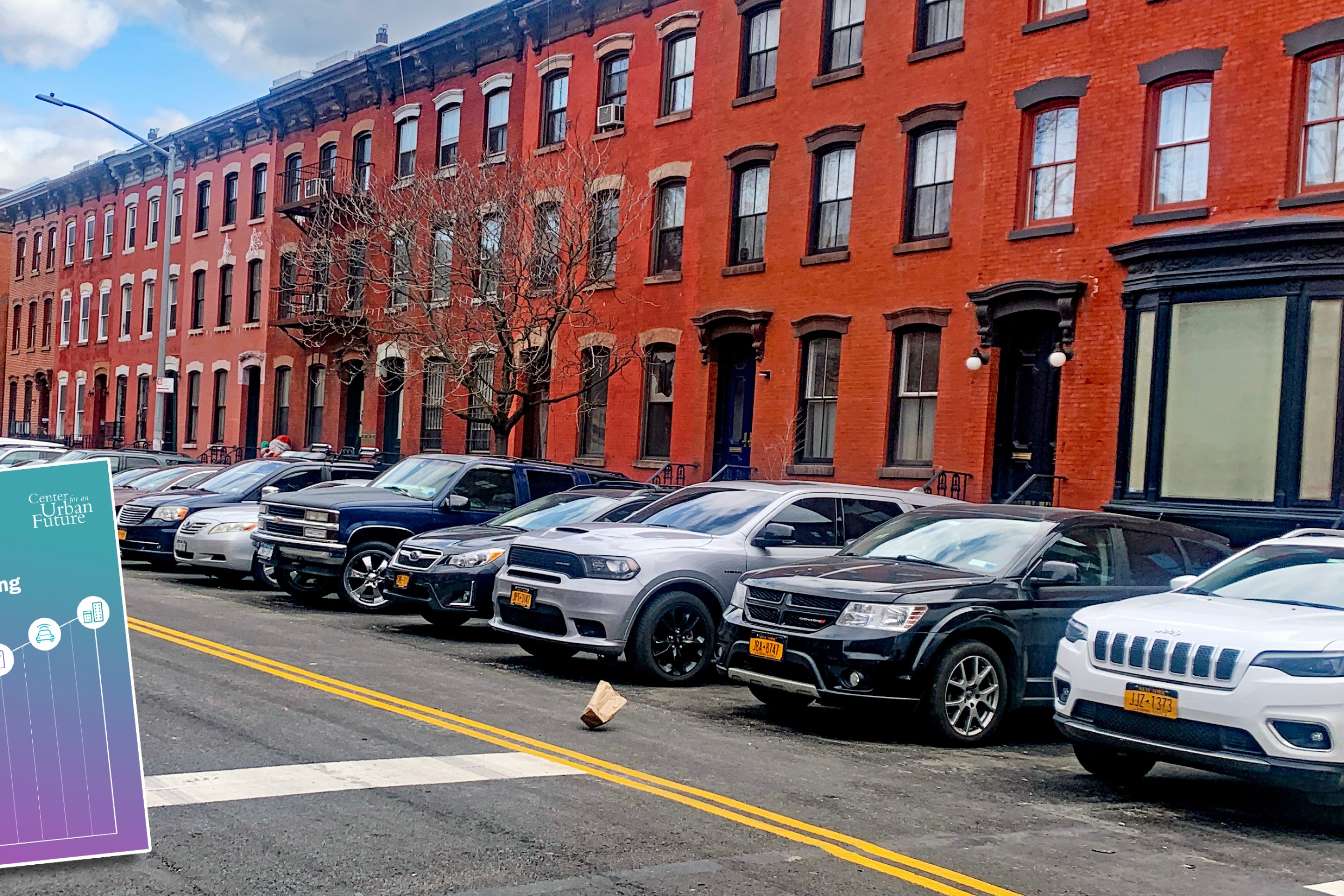Not a "linchpin"?!
Department of City Planning Director Dan Garodnick said on Wednesday that Mayor Adams's City of Yes zoning reform can still succeed even if the City Council cuts or changes one of the key proposals: the elimination of mandatory parking requirements for new developments.
At a New York Law School breakfast, moderator Ben Max asked Garodnick, "Is there a way you can describe how important it is that [the plan’s parts] go together — is parking ... the linchpin to making it work?”
The question reflected overwhelming expert sentiment that the largest city wide zoning change since 1961 — which comprises eight parts, all somewhat or fully dependent on developers' ability to avoid spending too much to build costly parking — can't fully succeed without eliminating mandatory parking minimums.
But Garodnick did not agree, noting the importance of removing parking to incentivize building housing, but also assuring that the plan can function without that piece.
"The parking piece is important, but not the linchpin to all of the things," Garodnick said. "It's important as a matter of policy for us to get out of the way of housing and parking requirements. [They] do impact, frequently, what is being built around the city. [The end of the parking mandate] is important, but it is not the linchpin and each of these has the ability to stand on its own.”
He also added that in "parts of the city [are] transit deserts where you do not have mass transit in the immediate midst, well, you better provide parking there or else you’re you’re not going to have any renters or purchasers."
The answer reflected the reality that many low-density areas of the city have opposed eliminating the parking mandate — a position that has forced the proposal onto the negotiating table in the Council review process.
Lively conversation this morning between @DanGarodnick and @TweetBenMax at @NYLawSchool about how #CityOfYes for Housing Opportunity would help address our housing crisis, and next steps as it advances to @NYCCouncil review! pic.twitter.com/zTYBXbjUQR
— NYC Planning (@NYCPlanning) October 2, 2024
Experts really don't want that to happen, arguing that removing the parking mandate would change the efficacy of the plan's other proposals.
“You can think of the proposal as a woven fabric, and one direction of the weave is parking, and the other direction is the other stuff,” said Howard Slatkin, executive director at Citizens Housing and Planning Council. "It’s not as if everything has to remain exactly as it is in order for the other to work, it’s just that they’re all connected, so if you pull on a thread it will affect the other stuff, too."
All eight parts would be affected if parking mandates are not removed. The Planning Department said it will not calculate exactly how many expected new units of housing would be sacrificed if the parking proposal is taken out, but would rather wait to see what the City Council proposes before undertaking any new calculations and modeling.
In certain districts, the lower-middle density ones that have not built much housing in recent history, the same problems would remain if the mandates stick around. Multi-family buildings are already allowed as of right in R4 or R5 districts, like much of Ridgewood in Queens and Flatbush in Brooklyn, but they rarely if ever get built because the parking requirements make the projects expensive and unfeasible.
“If you were to provide the maximum number of units you could build, even under today’s zoning, it would be prohibitive to put all the parking spaces in. What you get instead is you get a different housing type,” said Slatkin. “Removing the mandate lets you build the kind of housing you want to build first. Rather than letting the parking determine the housing.”
The plan’s “Town Center Zoning” proposal seeks to build more small-scale, mixed-use residential housing, creating neighborhood centers where New Yorkers can utilize floor-level commercial spaces while living in mid-density apartment buildings. There are a lot of areas in New York already zoned like this, but the housing doesn’t get built because of parking — if the parking mandates remain, these newly zoned town-center areas will likely suffer the same fate.
“Today, there are a lot of commercial streets in low-density neighborhoods that are already zoned for low-density housing and commercial,” said Slatkin. "[But] there are a couple of reasons why it doesn’t get built, but the biggest one is if you have to find space for all those residential and commercial parking spaces, you wouldn't have any space left for the ground floor of the building – and the whole point of a mixed-use building is that the ground floor is commercial."
Some experts believe that the proposal to remove parking mandates is the New York playing catchup to other major cities, like London, that have already removed these types of mandates, and even created caps to disincentivize car ownership and create more housing.
“This should have happened many years ago,” said Zhan Gou, a professor of urban planning and transportation policy at NYU. “[Removing parking mandates] would be the single most important achievement from the City of Yes. The city has tried so many things to promote affordable housing, but we forget the big bad guy in the room, which is the parking requirement.”
The City Council has 50 days to review the rezoning proposal; some progressive members — who certainly have been critical of Mayor Adams, even before his indictment on corruption charges — still support of the elimination of parking mandates.
“It’s absolutely clear that parking mandates block housing, they block extra space for the folks living in communities, they block plazas, and the ability to live in a climate friendly city," Council Member Shahana Hanif (D-Brooklyn) told Streetsblog after a “people over parking” rally at City Hall last week. "This is really good for our city, this is good for the future of our city.”
Council Members Lincoln Restler (D-Brooklyn) echoed that.
“We face an affordability crisis in our city that is real," he said. "We desperately need more affordable housing, but we also need more housing overall. I strongly support the policy that would eliminate parking minimums, this is a policy that I have embraced in my district and with Council members across Brooklyn.”
Other progressive groups have joined the voices calling for the elimination of parking mandates, seeing the proposal as important climate policy.
“New York City residents are on average less polluting than other Americans, and the reason is that New Yorkers largely live in dense places without cars,” said Pete Sikora, a campaign director with New York Communities for Change. "This proposal deals with both of those issues, which is, it encourages more density, which is the reason that eight million plus people live here, and it discourages excessive car use."






